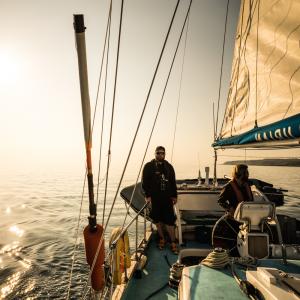Scottish fisheries management is governed by European legislation under the Common Fisheries Policy (CFP) which underwent major reform in 2013. We contributed to the reform process and most of our key asks were reflected in the new Regulation. This included a commitment to end overfishing and the wasteful practice of discarding.
We're now engaged in the implementation of these important commitments and how some of the challenges that they pose can be best met. For example we're helping ensure that boats are more selectively in order to avoid catching unwanted fish.
The ban on discarding, address the wasteful practice of removing healthy fish and then throwing them back into sea. It represents one of the biggest operational shifts in European fisheries as it will require fisheries to operate much more selectively than they have to date. It was introduced in certain fisheries in 2015 and will be phased in to cover all by 2019.
The ban presents clear opportunities, most obvious of which is more fish in the sea. However if it is implemented poorly there is a risk that illegal fishing practice might become commonplace. We've highlighted this challenge and in how to monitor compliance of the ban.
We've produced a report in 2015 - ‘Remote Electronic Monitoring’ - that demonstrates that a system of onboard cameras and sensors to monitor catches is the most cost effective and efficient way of monitoring implementation and enforcement on the water. This technology - if adopted across fishing fleets - offers much higher levels of coverage for less money than traditional methods.
Fleet wide adoption of this technology would not only provide assurances to buyers and sellers of fish that new regulations were operating successfully but also provide a level playing field across the industry with everyone subject to the same levels of monitoring.
Fisheries will of course be influenced by the recent Brexit referendum vote. However, management will continue according to the CFP until such time as the UK leave the EU. Whatever happens we're clear that any new legislation must at a minimum implement the key management operatives of the CFP.
In Scotland we sit on the Fisheries Management and Conservation Group (FMAC). This is one of the main vehicles for developing ways of sustainably managing Scottish fisheries. There are many challenges ahead but through this co-management approach Scotland has trialled and implemented many good management initiatives to date.
We hope that this system will continue to deliver improvements and help meet the challenges of delivering economically, socially and environmentally sustainable fisheries and in doing so set an example to other Member States and beyond.
 Why UK seas and coasts are important
Why UK seas and coasts are important